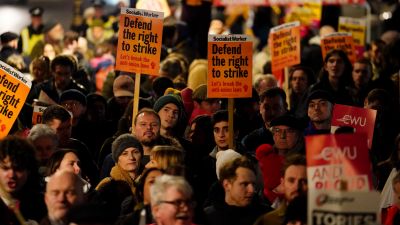Minimum Service Level Bill: New powers to limit strike action clears the Commons

The government’s new strikes Bill has cleared the Commons, but has continued to spark controversy.
The Bill will be subject to legal challenges unless it is drastically amended, Jacob Rees-Mogg warned on Monday night.
The Conservative former business secretary has given his backing to the Strikes (Minimum Services Levels) Bill in the Commons, but said it was “badly written” and criticised the sweeping powers it gives to his successor Grant Shapps.
Mr Rees-Mogg urged ministers to allow the House of Lords to amend the Bill to add detail to it, claiming this would mean it was “much less susceptible to judicial review”.
The Bill cleared the Commons in a late-night Monday sitting, with MPs voting 315 to 246, majority 69.
The controversial proposals aim to ensure there are minimum working standards during strike days across six sectors, including health and transport.
Mr Rees-Mogg told the Commons: “I am a supporter of this Bill, I think this is a good Bill and a proportionate Bill, but it is a badly written Bill.”
The North East Somerset MP criticised clause 3 in particular, aimed at giving the Business Secretary powers to define minimum service levels at a later date.
Labour deputy leader Angela Rayner branded the Bill the “Conservative sacking nurses Bill” and said Labour would repeal it if the party was elected to power.
She added: “It threatens key workers with the sack during a workers shortage and crisis, mounts an outright assault on the fundamental freedom of working people, while doing absolutely nothing to resolve the crisis at hand.
“Let’s look at what this is really all about: a government that is playing politics with key workers’ lives because they can’t stomach negotiation, a government that is lashing out at working people instead of dealing with its 13 years of failure, and a government and Prime Minister dangerously out of his depth and running scared of scrutiny.
“We on these benches will vote against this shoddy, unworkable Bill.”
Business Secretary Mr Shapps claimed the Bill was “simply proposing to protect people’s lives and to protect people’s livelihoods”.
MPs from Wales and Scotland sought to exclude the devolved nations from the Bill’s remit.
An SNP-backed amendment aiming to make sure the Bill would not come into force without the consent of the Welsh and Scottish parliaments was rejected by 321 to 46, majority 275.
The Bill will undergo further scrutiny in the House of Lords at a later date.
Unions have dubbed it the “anti-strike bill”, saying it could lead to workers, who legally vote to strike, being sacked.
If you've been impacted by the recent strike action and would like to share your story, email yourstory@itv.com
It comes as the wave of industrial unrest convulsing the public sector shows no sign of abating.
The UK is facing the largest scale strike day in over a decade on Wednesday, as half a million workers plan industrial action expected to spark widespread disruption.
Hundreds of thousands of workers will go on strike on Wednesday in separate disputes over pay, jobs and conditions in what will be the biggest day of industrial action in more than a decade.
Teachers, university lecturers, train drivers, civil servants, bus drivers and security guards in seven trade unions will stop work on the same day.
Want a quick and expert briefing on the biggest news stories? Listen to our latest podcasts to find out What You Need To Know